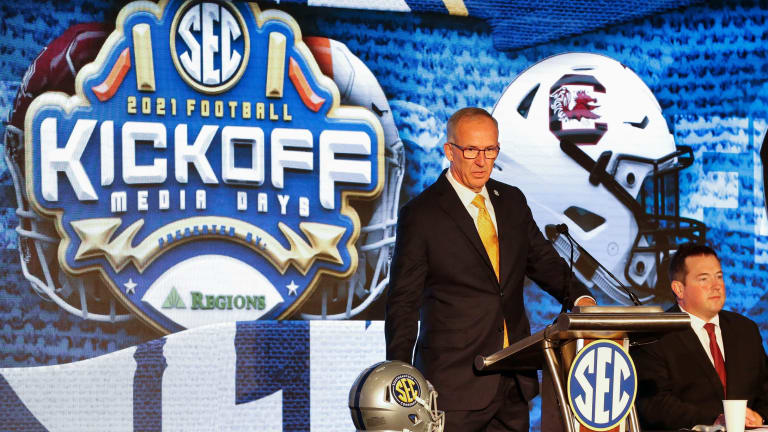
Mr. CFB: Texas-OU To The SEC? We Should Have Seen It Coming

“When you are finished changing, you’re finished” --Benjamin Franklin.
To the best of our knowledge, Ben never had to go through conference realignment. But given the change that college athletics is currently undergoing and will undergo in the near future, his words ring true.
Here is the hit parade of change that has hit college athletics in less than a year:
**--The transfer portal. It basically creates free agency in college football.
**--Name, Image Likeness: It allows college athletes to receive cash and other financial considerations with very few limitations.
**--The 12-team college football playoff. It could happen as soon as the 2023 post-season.
**--On June 21 the United State Supreme Court ruled 9-0 that the NCAA’s amateur model is no long viable. A concurring opinion from Justice Brett Kavanaugh flatly stated that the NCAA’s financial model is a violation of antitrust law.
**--NCAA President Mark Emmert raises the white flag saying the governance of college athletes needs to go back to the conferences.
**--News breaks last Wednesday that Texas and Oklahoma are leaving the Big 12 and will apply for membership in the SEC.
Put it all together and the coming months and years will bring seismic change the likes I have never seen in college athletics.
And we should have seen it coming.
That’s because each of the six things listed above are interconnected. They all point to the same thing: College athletics, and particularly college football, as we have known it is going to change and change dramatically. The SEC and its visionary commissioner, Greg Sankey, are going to be the leaders.
“It all fits perfectly now,” said Vince Thompson, the CEO of MELT, one of the country’s top sports marketing firms. “Everybody else in college athletics is playing checkers. But Sankey is playing chess. And he’s a couple of moves ahead of everybody.”
On July 19 Sankey gave his annual state of the conference/college athletics address to the masses at SEC Media Days in Hoover, just outside of Birmingham.
Most of the headlines generated that day dealt with his blunt talk about raising the number of athletes who are vaccinated against the COVID-19 virus. He made it clear that unlike last season, when the SEC played a conference-only schedule and ultimately played 69 of 71 scheduled games, the SEC would not be rescheduling games impacted by the virus in 2021.
But later in his remarks Sankey told the media that back in December he sent a lengthy letter to the NCAA Division I Council. Bottom line of his letter: He is not happy with the NCAA’s enforcement process.
“Those accused of violations deserve a fair and timely outcome and those who compete against those accused of violations deserve that same fair and timely outcome.”
And then he said this about the SEC’s place on the college athletics landscape:
“The most recognized, the expectations, demands, and pressures that are present on the campuses of this conference are not uniform across all of Division I, and expecting every conference to come together to debate, discuss and produce effective decisions for every one of us is not our modern reality. We must begin to adapt.”
Translation: The SEC can no longer wait on leadership from a central body like the NCAA. It’s time for the SEC to chart its own course.
Then he said:
“Our present reality highlights the need for a national dialogue on what is expected of college sports, be it health care, educational certainty, career transition, examining the economics or myriad other issues.”
In an interview with Ross Dellenger of SI.com that was published before his address on SEC Media Days, Sankey made clear his unhappiness with how the NCAA does its business.
He mentioned the governing structure of the College Football Playoffs, which includes the commissioners of the 10 FBS conferences plus Notre Dame. He called it “productive and constructive” and then added, tongue in cheek, “It ought to be a model for the NCAA to follow.”
So here we go.
On Monday Texas and Oklahoma informed the Big 12 that they would not be a part of the next round of television negotiations for the conference. The current deal with ESPN and FOX runs through the 2024-2025 regular season. In a joint letter to the conference, the schools said that “The universities intend to honor their existing grant of rights agreements.”
But based on past history, it is highly unlikely that Texas and OU will stay in the Big 12 for four more seasons. There will be a negotiation and both sides will settle on a dollar figure and a timetable for Texas and OU to leave.
On Tuesday Texas and Oklahoma made it official by requesting that they be considered for membership in the SEC. Published reports on SI.com say that the SEC presidents will meet on Thursday to consider that request. A vote may or may not be taken at that time because of the work that still needs to be done on the TV contracts.
Texas A&M athletics director Ross Bjork was clearly against Texas joining the SEC when the story broke last Wednesday but has softened that position since. Don’t be surprised if Texas A&M takes one for the team the public vote is 14-0 in favor of taking both Texas and OU.
Other than when Texas and Oklahoma will actually become members of the SEC, the only remaining question is: Does SEC expansion stop with 16 teams? What if another powerhouse school calls?
Given the amount of change that is coming, will the SEC consider a model even bigger and bolder to meeting those challenges?
We’ll see. It is going to be fascinating to watch.